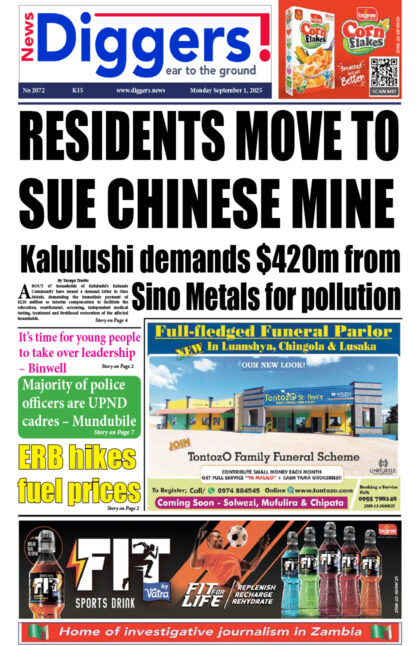Zambia Chamber of Mines president Goodwell Mateyo has cautioned government against proceeding with the sale of Konkola Copper Mines (KCM) before the arbitration process in South Africa is completed.
And Mateyo has called on government to create conditions for enhanced production in the mining sector to increase revenue.
Speaking on Hot FMs Frank on Hot programme, Tuesday, Mateyo warned that going against the development agreement, which required arbitration in an event of disagreement, could create a perception of expropriation that could hinder further investment in the sector.
“My advice to the government is to play this with an absolute straight bat which is basically to say, the government (ZCCM-IH) and KCM (Vedanta) signed shareholders agreement to manage this relationship. So any steps in terms of resolving this issue must be done to the letter of this agreement. I am meant to understand that the dispute resolution mechanism was arbitration and I think I would urge the government to strongly pursue that mechanism even before going into processes of carrying out a sale because the challenge now is that there is a risk or perception of expropriation that’s created and what it does is it then hinders further investment in the sector…it might appear to investors abroad that this is not an environment we can do business in,” Mateyo explained.
He also complained about the inconsistency in the mining tax regime, which he said was causing distortion in the sector as seen in the reduced production numbers.
“For your information, we have our mining tax regime change 10 times in the last 16 years. Now when you think about our industry, mining is a very long-term endeavour. Previously, the consultation was far more robust than it is now at the moment. There seems to be a polarisation of views on the part of government and the consultation should be far more engaging than it is at the moment. I think the previous mining tax regime is one that industry believed would result in a fair outcome and make operating in this jurisdiction not onerously expensive compared to operating in other jurisdictions. So what these changes do is they cause distortion in the industry and these distortions can be seen in the production numbers coming out of the Central Statistics Office,” Mateyo said.
He said sentiments that mining companies cooked production figures were “extremely false” as government had put up a strict monitoring system.
“Recently, the Ministry of Mines, with assistance form the European Union, has implemented a system called MOSES. What this does is that from the process where you mine ore, you declare it and send to the ministry. At every point of production or the mining value chain, there is tracking of production to the point that when you have metal, even before you declare to the Ministry of Mines and to ZRA, from their system, they are able to tell how much you have produced. There has been a lot of audit to say not all the production figures reported are inaccurate but we haven’t seen any report that has conclusively stated that the production figures are not correct. It’s a populist narrative that is completely divorced from the facts on the ground,” Mateyo clarified.
Meanwhile, Mateyo noted the need to create conditions that would allow improved production in the sector.
“So according to the EITI Zambian Chapter 2016 report, in 2016, out of total income and sales in the industry of approximately K40 billion, K10 billion of that found itself in government Treasury through dividends and taxes. So what this means is that 25 per cent of total revenues earned, not profits, but total sales from the industry are finding themselves in the government contribution. I think that’s a significant contribution by any standard in the world but there is a general view that the contribution is not enough. But if we want to improve the benefits of mining to the economy, I think we need to create the conditions to improve mining production because if we talk about total sales of K40 billion kwacha at the time, I think it was US$4 billion, it’s a significant amount but in terms of what we can do, it’s not that significant,” said Mateyo.
























